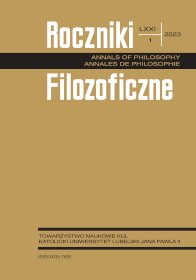CZY WSPÓŁCZESNE ROZUMIENIE PROBLEMU BOŻEJ UKRYTOŚCI PROWADZI DO ATEIZMU?
DOES THE CONTEMPORARY UNDERSTANDING OF THE PROBLEM OF GOD’S HIDDENNESS LEADS TO ATHEISM?
Author(s): Ryszard MordarskiSubject(s): Contemporary Philosophy, Philosophy of Religion, Sociology of Religion, Psychology of Religion
Published by: Towarzystwo Naukowe KUL & Katolicki Uniwersytet Lubelski Jana Pawła II
Keywords: Divine hiddenness; classical theism; absconditeism; the hiddenness argument; theism vs. atheism; friendly theism vs. friendly atheism; Miłosz Hołda; Marek Dobrzeniecki; John L. Schellenberg;
Summary/Abstract: The article discusses two excellent works on the hiddenness of God by Miłosz Hołda (Źródło i noc. Wprowadzenie do współczesnego absconditeizmu [The Spring and the Night: An Introduction into Contemporary Absconditheism]) and Marek Dobrzeniecki (Ukrytość i Wcielenie. Teistyczna odpowiedź na argument Johna L. Schellenberga za nieistnieniem Boga [Hiddenness and the Incarnation: A Theistic Response to John L. Schellenberg’s Argument for Divine Nonexistence]). They belong to the so-called friendly theists, who try to treat the thesis of God’s hiddenness as an important extension of the problems of classical theism. It seems, however, that they succumb to the illusion of conducting a dialogue with the so-called friendly atheists, who involve theists in such an interpretation of the thesis about the Divine hiddenness, which seems to be completely contrary to classical theism. The question then arises: whether the contemporary formulations of the problem of the Divine hiddenness are in any way compatible with Christian theism?
Journal: Roczniki Filozoficzne
- Issue Year: 71/2023
- Issue No: 1
- Page Range: 389-412
- Page Count: 24
- Language: Polish

